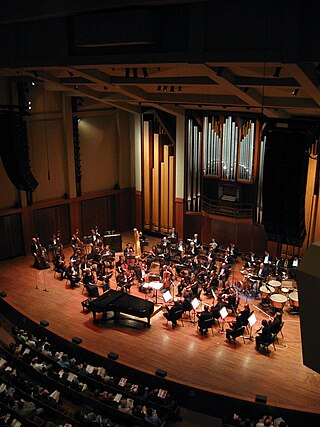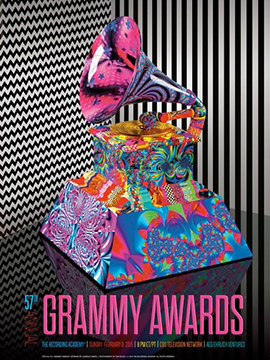Related Research Articles

The Pulitzer Prize for Music is one of seven Pulitzer Prizes awarded annually in Letters, Drama, and Music. It was first given in 1943. Joseph Pulitzer arranged for a music scholarship to be awarded each year, and this was eventually converted into a prize: "For a distinguished musical composition of significant dimension by an American that has had its first performance in the United States during the year."

The Seattle Symphony is an American orchestra based in Seattle, Washington. Since 1998, the orchestra is resident at Benaroya Hall. The orchestra also serves as the accompanying orchestra for the Seattle Opera.

John Luther Adams is an American composer whose music is inspired by nature, especially the landscapes of Alaska, where he lived from 1978 to 2014. His orchestral work Become Ocean was awarded the 2014 Pulitzer Prize for Music.
Zhou Long is a Chinese American composer. He won the 2011 Pulitzer Prize for Music.
The Barcelona Symphony Orchestra and National Orchestra of Catalonia is a symphony orchestra based in Barcelona, Spain. Since April 1999, the Orchestra has had its headquarters at L'Auditori. Prior to that, from its foundation to 1998, the orchestra was resident at the Palau de la Música Catalana.

Sinfonia (Symphony) is a composition by the Italian composer Luciano Berio which was commissioned by the New York Philharmonic for its 125th anniversary. Composed in 1968–69 for orchestra and eight amplified voices, it incorporates musical quotations to represent an abstract and distorted history of culture. The eight voices are not incorporated classically but rather speak, whisper and shout excerpts from texts including Claude Lévi-Strauss' The Raw and the Cooked, Samuel Beckett's novel The Unnamable, instructions from the scores of Gustav Mahler and other writings.
Ludovic Morlot is a French conductor.
Jennifer Higdon's Concerto for Violin and Orchestra was written in 2008. The work was jointly commissioned by the Indianapolis Symphony Orchestra, the Toronto Symphony Orchestra, the Baltimore Symphony Orchestra, and the Curtis Institute of Music. It was composed for the violinist Hilary Hahn and was given its world premiere by Hahn and the Indianapolis Symphony Orchestra under the conductor Mario Venzago on February 6, 2009. The piece was later awarded the 2010 Pulitzer Prize for Music.

Anna Sigríður Þorvaldsdóttir is an Icelandic composer. She has been called "one of Iceland's most celebrated composers", and was the 2012 winner of the Nordic Council Music Prize. Her music is frequently performed in Europe and in the United States, and is often influenced by landscapes and nature.

The 57th Annual Grammy Awards were held on February 8, 2015, at the Staples Center in Los Angeles, California. The show was broadcast live by CBS at 5:00 p.m. PST (UTC−8). Rapper LL Cool J hosted the show for the fourth consecutive time.
L'arbre des songes is a violin concerto written by Henri Dutilleux between 1983 and 1985. It is dedicated to Isaac Stern.
Become Ocean is an orchestral composition by American composer John Luther Adams. The Seattle Symphony Orchestra commissioned the work and premiered it at Benaroya Hall, Seattle, on 20 and 22 June 2013. The work won the 2014 Pulitzer Prize for Music and the 2015 Grammy Award for Best Classical Contemporary Composition. In 2019, writers of The Guardian ranked it the 10th greatest work of art music since 2000.
The Symphony No. 4 is an orchestral composition by the American composer John Harbison. The work was commissioned by the Seattle Symphony with contributions from the philanthropists Richard and Constance Albrecht. It was given its world premiere in Seattle on June 17, 2004 by the Seattle Symphony under the direction of Gerard Schwarz.
Absolute Jest is a concerto for string quartet and orchestra by the American composer John Adams. The work was commissioned by the San Francisco Symphony for the orchestra's centennial. Its world premiere was given at the Louise M. Davies Symphony Hall on March 15, 2012, and was performed by the St. Lawrence String Quartet and the San Francisco Symphony under the direction of Michael Tilson Thomas. However, after the premiere Adams heavily re-wrote the beginning of the piece; this revised version of Absolute Jest was first performed in Miami Beach on December 1, 2012, by the St. Lawrence String Quartet and the New World Symphony under the composer's direction.
Dark Waves is a 2007 musical composition in one movement by the American composer John Luther Adams. It was commissioned by Musica Nova for the Anchorage Symphony Orchestra, who premiered the composition in 2007. The piece is dedicated to the Alaskan conductor Gordon Wright, who died a few days before the world premiere.

The National Youth Orchestra of China is a full symphony youth orchestra composed of approximately 100 Chinese musicians aged 14 to 21 years old. Students from all over China audition to participate in a two-week training residency before performing alongside a renowned soloist and conductor in premier venues throughout the world.
Nathan Lee is a Korean-American pianist. Described by The New York Times as a "prodigiously talented" pianist with "musical insight and sensitivity", Lee was a winner of the 2016 Young Concert Artists International Auditions.
Vincent Accettola is an American producer and arts administrator who previously served as Managing Director of the National Youth Orchestra of China.
What Do We Make of Bach? is a composition for obbligato organ and orchestra written by the American composer John Harbison. The work was commissioned by Minnesota Orchestra, Seattle Symphony, and Northrop at the University of Minnesota. It was given its world premiere by the organist Paul Jacobs and the Minnesota Orchestra at the Northrop Auditorium on October 12, 2018.
Aaron Jay Kernis's Violin Concerto was written between 2016 and 2017 for the violinist James Ehnes on a joint commission from the Toronto Symphony Orchestra, the Seattle Symphony, the Melbourne Symphony Orchestra, and the Dallas Symphony Orchestra, with support of the Norma and Don Stone Fund for New Music. Its world premiere was performed by Ehnes and the Toronto Symphony Orchestra conducted by Peter Oundjian at Roy Thomson Hall, Toronto, on March 8, 2017. Kernis dedicated the piece to James Ehnes "with great admiration and friendship." The concerto later received the 2019 Grammy Awards for Best Contemporary Classical Composition and Best Classical Instrumental Solo.
References
- 1 2 3 Luther Adams, John (2017). "Become Desert". G. Schirmer Inc. Retrieved July 16, 2023.
- 1 2 Huizenga, Tom (June 6, 2019). "John Luther Adams' 'Become Desert' Shimmers In Majestic Stillness". NPR . Retrieved July 16, 2023.
- ↑ May, Thomas (March 30, 2018). "Seattle Symphony reaches another high with John Luther Adams' searingly beautiful 'Become Desert'". The Seattle Times . Retrieved July 16, 2023.
- ↑ Walls, Seth Colter (March 30, 2018). "Review: A Pulitzer Sequel for Orchestra, Packed With Drama in Microcosm". The New York Times . Retrieved July 16, 2023.
- 1 2 Clements, Andrew (July 4, 2019). "John Luther Adams: Become Desert review – a unique voice turns to the sands". The Guardian . Retrieved July 16, 2023.
- ↑ Wilkie, Ben (August 20, 2019). "John Luther Adams: Become Desert (Seattle Symphony/Ludovic Morlot)". Limelight . Retrieved July 16, 2023.